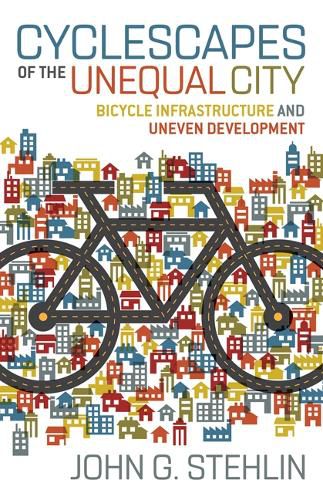Readings Newsletter
Become a Readings Member to make your shopping experience even easier.
Sign in or sign up for free!
You’re not far away from qualifying for FREE standard shipping within Australia
You’ve qualified for FREE standard shipping within Australia
The cart is loading…






Not long ago, bicycling in the city was considered a radical statement or a last resort, and few cyclists braved the inhospitable streets of most American cities. Today, however, the urban cyclist represents progress and the urban renaissance. City leaders now undertake ambitious new bicycle infrastructure plans and bike share schemes to promote the environmental, social, and economic health of the city and its residents. Cyclescapes of the Unequal City contextualises and critically examines this new wave of bicycling in American cities, exploring how bicycle infrastructure planning has become a key symbol of - and site of conflict over - uneven urban development.
John G. Stehlin traces bicycling’s rise in popularity as a key policy solution for American cities facing the environmental, economic, and social contradictions of the previous century of sprawl. Using in-depth case studies from San Francisco, Philadelphia, and Detroit, he argues that the mission of bicycle advocacy has converged with, and reshaped, the urban growth machine around a model of liveable, environmentally friendly, and innovation-based urban capitalism. While advocates envision a more sustainable city for all, the deployment of bicycle infrastructure within the framework of the neoliberal city in many ways intensifies divisions along lines of race, class, and space.
Cyclescapes of the Unequal City speaks to a growing interest in bicycling as an urban economic and environmental strategy, its role in the politics of gentrification, and efforts to build more diverse coalitions of bicycle advocates. Grounding its analysis in both regional political economy and neighbourhood-based ethnography, this book ultimately uses the bicycle as a lens to view major shifts in today’s American city.
‘Through rigorous empirical research and thoughtful analysis, John G. Stehlin illuminates the emergence of a complex politics of mobility that stems from the intersection of cycling and urban change.’ - Kathe Newman, Rutgers University ‘This is an excellent investigation of the role of cycling in remaking of the street. With a close eye on the relationship between cycling and urban transformation in North America, John G. Stehlin offers a lucid and important analysis of how cycling becomes caught up in exclusionary relations between race, gentrification, and the city. Cycling becomes an infrastructure of both sustainability and economic exclusion. Yet, as Stehlin shows, it can also become part of a more hopeful and progressive politics for the city.’ - Colin McFarlane, Durham University
$9.00 standard shipping within Australia
FREE standard shipping within Australia for orders over $100.00
Express & International shipping calculated at checkout
Not long ago, bicycling in the city was considered a radical statement or a last resort, and few cyclists braved the inhospitable streets of most American cities. Today, however, the urban cyclist represents progress and the urban renaissance. City leaders now undertake ambitious new bicycle infrastructure plans and bike share schemes to promote the environmental, social, and economic health of the city and its residents. Cyclescapes of the Unequal City contextualises and critically examines this new wave of bicycling in American cities, exploring how bicycle infrastructure planning has become a key symbol of - and site of conflict over - uneven urban development.
John G. Stehlin traces bicycling’s rise in popularity as a key policy solution for American cities facing the environmental, economic, and social contradictions of the previous century of sprawl. Using in-depth case studies from San Francisco, Philadelphia, and Detroit, he argues that the mission of bicycle advocacy has converged with, and reshaped, the urban growth machine around a model of liveable, environmentally friendly, and innovation-based urban capitalism. While advocates envision a more sustainable city for all, the deployment of bicycle infrastructure within the framework of the neoliberal city in many ways intensifies divisions along lines of race, class, and space.
Cyclescapes of the Unequal City speaks to a growing interest in bicycling as an urban economic and environmental strategy, its role in the politics of gentrification, and efforts to build more diverse coalitions of bicycle advocates. Grounding its analysis in both regional political economy and neighbourhood-based ethnography, this book ultimately uses the bicycle as a lens to view major shifts in today’s American city.
‘Through rigorous empirical research and thoughtful analysis, John G. Stehlin illuminates the emergence of a complex politics of mobility that stems from the intersection of cycling and urban change.’ - Kathe Newman, Rutgers University ‘This is an excellent investigation of the role of cycling in remaking of the street. With a close eye on the relationship between cycling and urban transformation in North America, John G. Stehlin offers a lucid and important analysis of how cycling becomes caught up in exclusionary relations between race, gentrification, and the city. Cycling becomes an infrastructure of both sustainability and economic exclusion. Yet, as Stehlin shows, it can also become part of a more hopeful and progressive politics for the city.’ - Colin McFarlane, Durham University